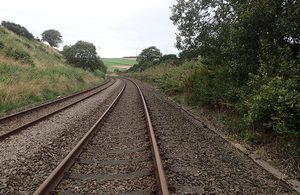Report 08/2021: Trains overspeeding between Laurencekirk and Portlethen
RAIB has today released its report into trains overspeeding between Laurencekirk and Portlethen, Aberdeenshire, 4 December 2020.

Part of the railway between Laurencekirk and Portlethen
Summary
On 4 December 2020, six trains exceeded a reduced speed limit which was temporarily in force between Laurencekirk and Portlethen, Aberdeenshire. A 40 mph (64 km/h) ‘blanket’ emergency speed restriction (BESR) had been imposed from the start of service on that day until 09:00 hrs, because of a forecast of heavy rain with the associated risk of an earthwork failure obstructing the line. In some instances, trains travelling through the BESR reached the normal maximum permitted speeds which varied along this length of line up to 100 mph (161 km/h) for the trains involved. In other instances, the reduced permitted speeds were exceeded for only parts of the BESR. The actual amount of rainfall was not sufficient to cause any earthwork failures, and no accident occurred.
The investigation found that some drivers were unaware of the BESR as they approached it, and others were unaware of its exact extent. A notice, displayed in the late notice cases at the locations where the drivers reported for duty, was the only information about the BESR provided to drivers. This notice did not convey information in a way that could be readily understood and remembered when drivers needed to apply it. Lineside signage is not used for BESRs and no other reminder was provided as trains approached the restriction. The BESR notice gave the limits in terms of both mileages and lineside features, but these did not correspond to each other. ScotRail had not recognised that use of the late notice case was an unreliable way to implement BESRs. However, some managers had improved reliability by local additions to the formal system. Although not directly relevant to the incident, RAIB observed that the BESR form contained in Network Rail procedures, and variants used in Scotland and on other routes, had shortcomings compared with good practice in human factors.
RAIB has concluded that the railway industry has more work to do to establish a suitable method for the imposition of speed restrictions, in response to extreme weather that has the potential to endanger infrastructure.
Recommendations
RAIB has made two recommendations and identified two learning points as a result of this investigation. The first recommendation seeks an improvement to the BESR notices provided to drivers and the second seeks a review of the methods used to implement blanket emergency speed restrictions. The learning points cover the importance of drivers being aware of information contained in late notices, and the need for safety critical communications to provide clear and unambiguous information.
Simon French, Chief Inspector of Rail Accidents said:
RAIB is concerned at the number of overspeeding incidents which occur at speed restrictions on the mainline network. Network Rail’s national daily report has recorded 7 cases so far in 2021, up from 5 in the whole of 2020, and some of these involved speed limits being exceeded by over 80 miles per hour.
This report highlights some of the causes of overspeeding. It shows how important it is to convey information to train drivers about emergency speed restrictions in a way that they can understand and retain. This is particularly vital where, as in this case, there are no lineside signs to mark where the restrictions begin and end. As we saw in an incident at Sandy in 2018 (RAIB report 10/2019), it is possible for a driver who has not been given advance notice of a speed restriction to take their train through it much faster than is safe. Since then, the tragic accident at Carmont in 2020 has resulted in the introduction of a new process which Network Rail uses to impose speed restrictions over areas affected by severe weather, such as heavy rain, which might cause the failure of earthworks.
The railway industry has more work to do to establish a suitable method for the imposition of speed restrictions which are needed in response to extreme weather that has the potential to endanger infrastructure. In this case the industry’s processes were ineffective, and it is fortunate that the weather was not as bad as feared and that no accident occurred.
Notes to editors
- The sole purpose of RAIB investigations is to prevent future accidents and incidents and improve railway safety. RAIB does not establish blame, liability or carry out prosecutions.
- RAIB operates, as far as possible, in an open and transparent manner. While our investigations are completely independent of the railway industry, we do maintain close liaison with railway companies and if we discover matters that may affect the safety of the railway, we make sure that information about them is circulated to the right people as soon as possible, and certainly long before publication of our final report.
- For media enquiries, please call 01932 440015.